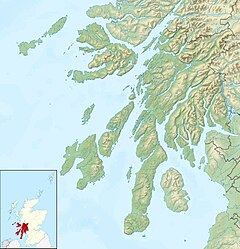Village in Scotland Human settlement in Scotland
Hunters Quay
| |
|---|---|
 Hunters Quay viewed from the Firth of Clyde, looking southwest Hunters Quay viewed from the Firth of Clyde, looking southwest | |
 | |
| Population | 5,198 (2013 Est) Including; Kirn, Hunters Quay and Sandbank. |
| OS grid reference | NS 18396 79130 |
| Council area |
|
| Lieutenancy area |
|
| Country | Scotland |
| Sovereign state | United Kingdom |
| Post town | DUNOON, ARGYLL |
| Postcode district | PA23 |
| Dialling code | 01369 |
| UK Parliament |
|
| Scottish Parliament |
|
| 55°58′15″N 4°54′42″W / 55.970717°N 4.9115818°W / 55.970717; -4.9115818 | |
Hunters Quay (Scottish Gaelic: Camas Rainich) is a village, on the Cowal Peninsula, in Argyll and Bute, Scottish Highlands. Situated between Kirn to the south and Ardnadam to the north, Hunters Quay is the main base of Western Ferries, operating between Hunters Quay and McInroy's Point.
Structures
Royal Marine Hotel
Main article: Royal Marine HotelThe current building was built in 1890. This and the previous building was, between 1872 and the 1950s, the home of the Royal Clyde Yacht Club, which was founded in 1856.
Hafton House
Main article: Hafton HouseBuilt in 1815 for James Hunter.
Villas
In the mid 19th century, the principal villas at Hunters Quay were Claver House (Mr Miller), Linnwood (Mr Somerville), Rock Hill (Capt. Littlejohn), Whinhill (Mrs Ross), Woodside (Mr Bell) and Craigend (Mr Bryson).
1908 Summer Olympic Games
Main article: Sailing at the 1908 Summer OlympicsThe 12-metre class yacht race in the 1908 London Olympic Games took place at Hunters Quay. Most of the sailing took place on the Solent, but only two boats entered the 12-metre class: Mouchette from the Royal Liverpool Yacht Club and Hera from the Royal Clyde Yacht Club. They were allowed to race on the Clyde for convenience. The course was twice round a 13-mile (21-kilometre) lap of the Clyde, starting and finishing at Hunters Quay. Thomas C. Glen-Coats' Hera won.
Jim Crow Rock – Puffin Rock

"Jim Crow", a pointed glacial erratic rock lying horizontally on the village's beach facing the Firth of Clyde, was known as the "Jim Crow Stone" by 1864, and by 1904 was painted with a face. There have been various suggestions for the inspiration behind the name and design: the Jim Crow character featured in Jump Jim Crow, a song and dance popularised in 1832 by the American minstrel show performer Thomas D. Rice; local stories suggest it could have been the name of the owner of a nearby builders'/joiners yard; a jackdaw ; or the later Jim Crow laws which were state and local laws enforcing racial segregation in the Southern United States. Another suggestion is that it was named after the line "So they canonized him by the name of Jim Crow!" in the 1837 poem The Jackdaw of Rheims.

Due to concerns about racism the rock was painted over several times, but repeatedly returned to its original state. In 2017, Neville Lawrence, father of Stephen Lawrence, saw the rock when he was on holiday in the area, and described it as saddening and disappointing, an uncomfortable reminder of division. It later attracted Black Lives Matter protests, and was painted black. In community efforts to find a way forward, a competition was held for young people to propose a unifying design. The winning design was by a pupil from Dunoon Grammar School, who with other pupils re-painted the rock in 2021 as a puffin.
Transport
Western Ferries
Main article: Western FerriesHunters Quay is the headquarters of Western Ferries. The existing Hunters Quay Pier was used since 1973. The port has since been expanded and now incorporates two floating ramps. The service connects to McInroy's Point near to Gourock in Inverclyde, on the eastern shore of the upper Firth of Clyde.
Gallery
-
 A view of the Holy Loch, looking northwest towards Kilmun.
A view of the Holy Loch, looking northwest towards Kilmun.
-
 The Royal Marine Hotel is the half-timbered building.
The Royal Marine Hotel is the half-timbered building.
-
 Hunters Quay viewed from Cloch Point.
Hunters Quay viewed from Cloch Point.
-
 A Western Ferries ferry approaching the quay.
A Western Ferries ferry approaching the quay.
References
- "Intermediate Zone: Hunter's Quay". Scottish Government. Retrieved 11 May 2018.
- "History". Royal Northern & Clyde Yacht Club. Retrieved 21 February 2024.
- "Hafton House (LB5071)". Historic Environment Scotland. Retrieved 21 February 2024.
- Colegate's Guide to Dunoon, Kirn, and Hunter's Quay (Second edition) - John Colegate (1868), page 28
- "Sailing at the 1908 London Summer Games: Mixed 12 metres". Sports-Reference. 18 April 2020. Archived from the original on 18 April 2020. Retrieved 21 February 2024.
- Bell, Dugald (1885). "Gourock and the Cloch". Among the Rocks Round Glasgow: A Series of Excursion-sketches and Other Papers. J. Maclehose & Sons. p. 154.
- Argyllshire: Area of Dunoon (Map). 1:10560. Ordnance Survey Office. 1869. Sheet CLXXXIV. Retrieved 1 August 2022 – via National Library of Scotland.
- ^ "Dunoon rocked by racism row". The Scotsman. 22 July 2011. Retrieved 16 February 2016.
- Dickens, C.; Ainsworth, W.H.; Smith, A. (1837). Bentley's Miscellany. Vol. 1. Richard Bentley. pp. 529–532. Retrieved 1 August 2022.
they canoniz'd him by the name of Jem Crow!
, text online with "Jim Crow". - Learmonth, Andrew (10 June 2020). "Dunoon's racist 'Jim Crow' rock is set to be scrubbed". The National. Retrieved 29 July 2022.
- "Meet Cowal's latest visitor attraction". Argyll Bute 24. 17 September 2021. Retrieved 22 October 2021.
- Polly Bartlett, "Controversial 'Jim Crow stone' transformed into proud Puffin Rock", STV News, 18 October 2021, retrieved and archived 22 October 2021.
- "Western Ferries (Clyde) Ltd". Western Ferries.
External links
- Map sources for Hunters Quay